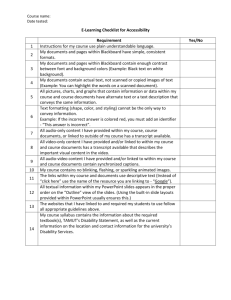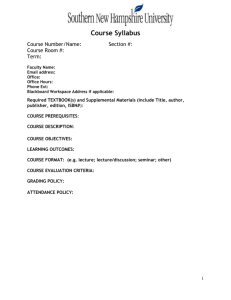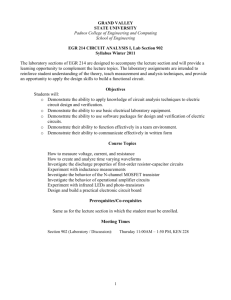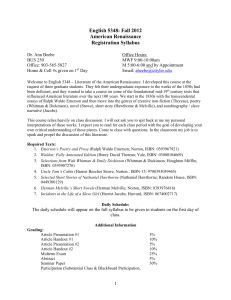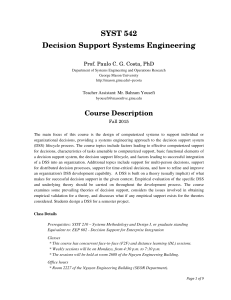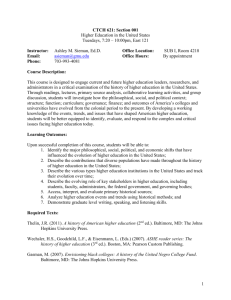- The School for Conflict Analysis and Resolution
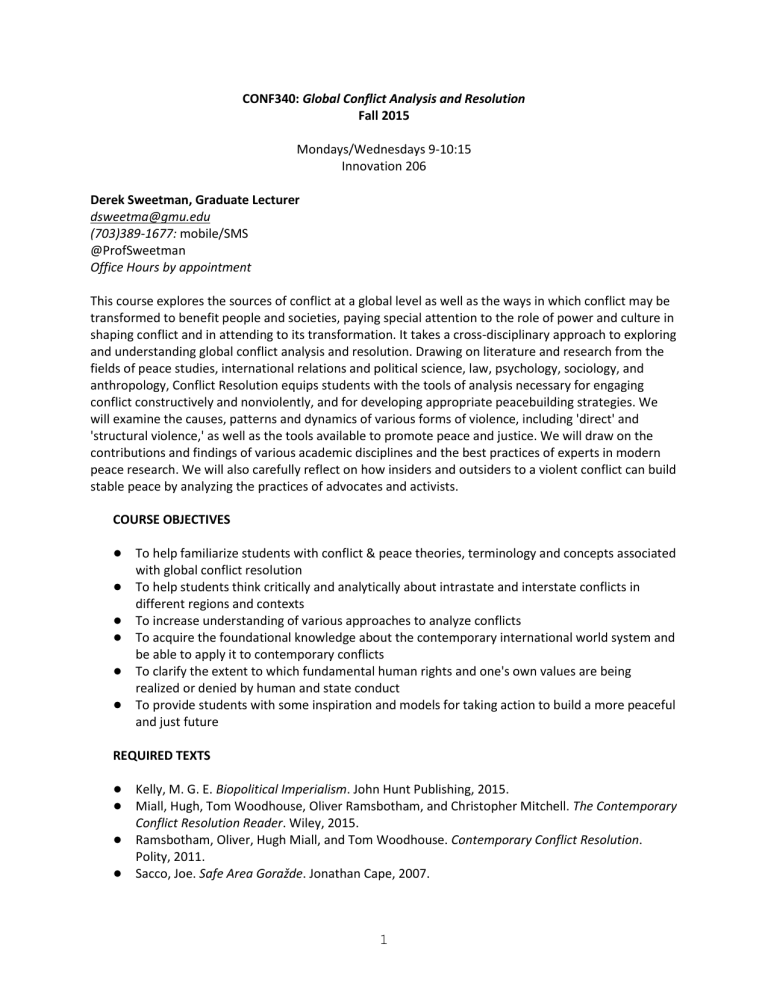
CONF340: Global Conflict Analysis and Resolution
Fall 2015
Mondays/Wednesdays 9-10:15
Innovation 206
Derek Sweetman, Graduate Lecturer dsweetma@gmu.edu
(703)389-1677: mobile/SMS
@ProfSweetman
Office Hours by appointment
This course explores the sources of conflict at a global level as well as the ways in which conflict may be transformed to benefit people and societies, paying special attention to the role of power and culture in shaping conflict and in attending to its transformation. It takes a cross-disciplinary approach to exploring and understanding global conflict analysis and resolution. Drawing on literature and research from the fields of peace studies, international relations and political science, law, psychology, sociology, and anthropology, Conflict Resolution equips students with the tools of analysis necessary for engaging conflict constructively and nonviolently, and for developing appropriate peacebuilding strategies. We will examine the causes, patterns and dynamics of various forms of violence, including 'direct' and
'structural violence,' as well as the tools available to promote peace and justice. We will draw on the contributions and findings of various academic disciplines and the best practices of experts in modern peace research. We will also carefully reflect on how insiders and outsiders to a violent conflict can build stable peace by analyzing the practices of advocates and activists.
COURSE OBJECTIVES
● To help familiarize students with conflict & peace theories, terminology and concepts associated with global conflict resolution
● To help students think critically and analytically about intrastate and interstate conflicts in different regions and contexts
● To increase understanding of various approaches to analyze conflicts
● To acquire the foundational knowledge about the contemporary international world system and be able to apply it to contemporary conflicts
● To clarify the extent to which fundamental human rights and one's own values are being realized or denied by human and state conduct
● To provide students with some inspiration and models for taking action to build a more peaceful and just future
REQUIRED TEXTS
● Kelly, M. G. E. Biopolitical Imperialism . John Hunt Publishing, 2015.
● Miall, Hugh, Tom Woodhouse, Oliver Ramsbotham, and Christopher Mitchell. The Contemporary
Conflict Resolution Reader . Wiley, 2015.
● Ramsbotham, Oliver, Hugh Miall, and Tom Woodhouse. Contemporary Conflict Resolution .
Polity, 2011.
● Sacco, Joe. Safe Area Goražde . Jonathan Cape, 2007.
1
SCHEDULE
The class schedule, including readings and assignment due dates are available on a public Google
Calendar at https://www.google.com/calendar/embed?src=56lt8i7dailpe2147vamtsvjus%40group.calendar.google.c
om&ctz=America/New_York (this link will be on the course Blackboard page).
BLACKBOARD
This course will include a significant online component through the course Blackboard site. You will also use it to submit your assignments and to find the weekly reading assignments. Make sure you check
Blackboard often.
ASSIGNMENT POLICIES
All assignments, unless otherwise noted, should be turned in on Blackboard. Late work will be accepted, but the grade for the assignment will be reduced by 10% each day it is late. After five days, work will only be accepted if approved. If you have a problem meeting a deadline, contact me before the assignment is due. Arrangements made after the due date are subject to the grade penalty.
ASSIGNMENTS
Detailed assignment descriptions are available on Blackboard.
●
●
●
Reading Reflections (150 points)
○ 1,000-word reflection papers of two of our books
○ Safe Area Gorazde, due 9/21
○ Biopolitical Imperialism, due 12/9
Class Check-ins (200 points, completed at the beginning of every class session)
Conflict Working Group (400 points total)
○ Each group will brief the class on the conflict they are studying every Wednesday, starting 9/23
○ Briefings will include news and the relevance of the week's readings to the conflict
○ Each person in the group needs to brief at least once
○ 30 points for each briefing
●
○ 100 points for participation (group member evaluations due 12/7)
Class Reflection (100 points, due December 14th)
○ Write a 1000-word reflection on your experience in the course
Reflective writing assignments give you a chance to work with ideas and concepts from class in the context of another experience. In general, it is best to follow a What?, So What?, Now What?
Format for these papers:
● What?
Describe your experience. This may include some summary, but should be focused more on your experience as a viewer/reader/actor/participant. Do not simply summarize a text.
● So What?
Incorporate the concepts and ideas from class into your experience. Did you see examples of these? Did the experience encourage you to think differently about them? What can these ideas and concepts tell us about the subject of your experience? What connections do
2
you see?
● Now What?
Contextualize the experience. How does it relate to your other work in the class, your other classes, or your future plans? Where are you going to take this knowledge?
Reflective writing should always be in an I voice, since you are writing about yourself. You can introduce the text or film you are discussing, but do not simply summarize it. The reflection is about you and your learning experience.
ACADEMIC INTEGRITY
The integrity of the University community is affected by the individual choices made by each of us.
Mason has an Honor Code with clear guidelines regarding academic integrity. Three fundamental and rather simple principles to follow at all times are that: (1) all work submitted be your own; (2) when using the work or ideas of others, including fellow students, give full credit through accurate citations; and (3) if you are uncertain about the ground rules on a particular assignment, ask for clarification. No grade is important enough to justify academic misconduct. Plagiarism means using the exact words, opinions, or factual information from another person without giving the person credit. Writers give credit through accepted documentation styles, such as parenthetical citation, footnotes, or endnotes.
Paraphrased material must also be cited, using MLA or APA format. A simple listing of books or articles is not sufficient. Plagiarism is the equivalent of intellectual robbery and cannot be tolerated in the academic setting. If you have any doubts about what constitutes plagiarism, please see me.
DISABILITY AND LEARNING ACCOMMODATIONS
If you have a documented learning disability or other condition that may affect academic performance you should: 1) make sure this documentation is on file with Office of Disability Services (SUB I, Rm. 4205;
993-2474; http://ods.gmu.edu) to determine the accommodations you need; and 2) talk with me to discuss your accommodation needs.
I appreciate that not all learning challenges can be covered by disability services and am committed to working with students who do not have formal disability statements as well as those who do. If you have particular needs that can be accommodated, let me know and I will do my best.
DIVERSITY
GMU is an intentionally inclusive community that celebrates diversity and strives to have faculty, staff and students who reflect the diversity of our plural society. We do not discriminate on the basis of race, class, linguistic background, religion, gender identity, sex, sexual orientation, ethnicity, age, or disability.
3
